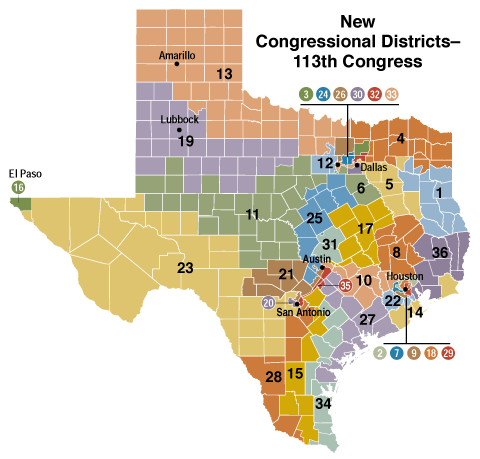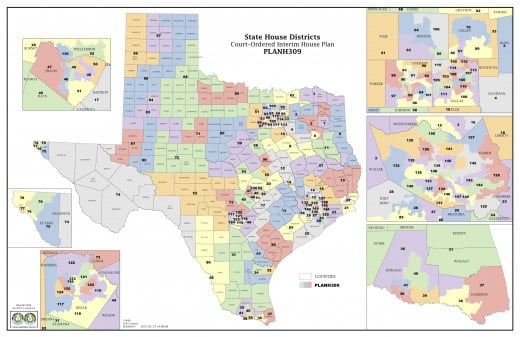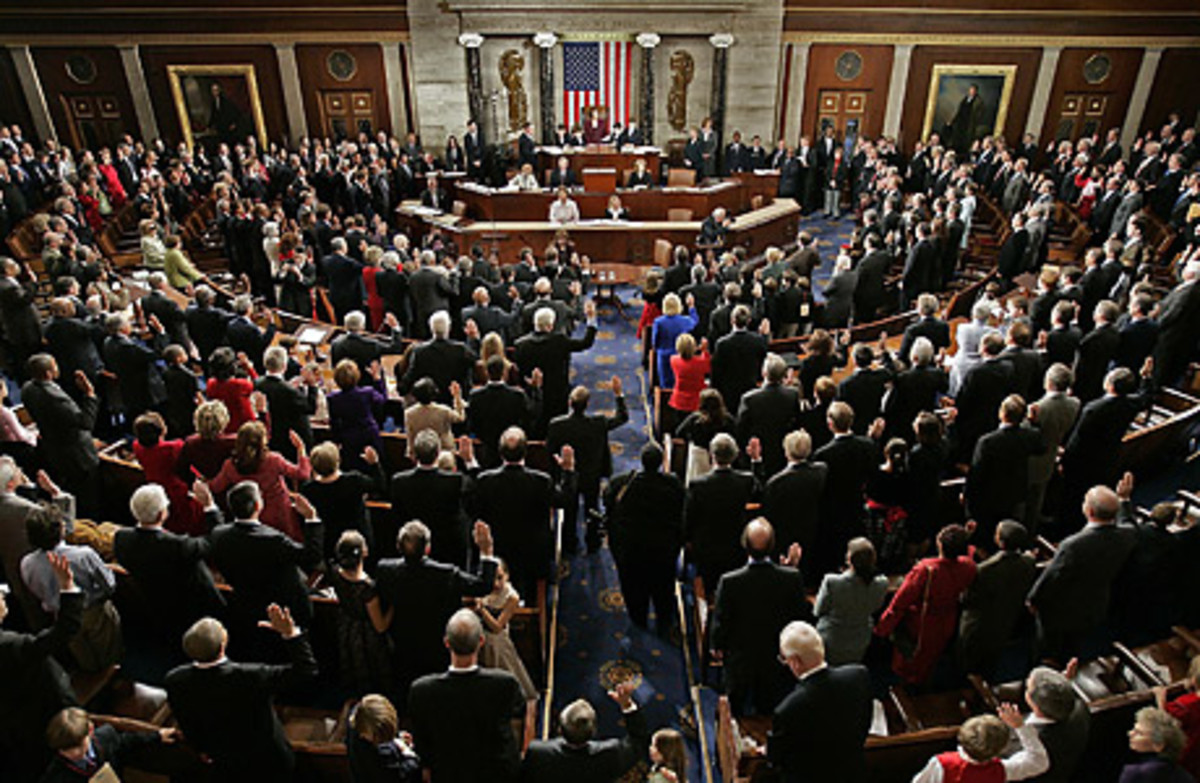The Need for a Constitutional Amendment to Eliminate Gerrymandering When Selecting Members of the House
TEXAS CONGRESSTIONAL DISTRICTS TAKING POLITICS INTO CONSIDERATION

IN 1787, WHEN 55 MEN GATHERED IN PHILADELPHIA to write a Constitution which would create a new nation. One of the principal hopes, if not goals, of each was to construct it in such a way as to minimize political factionalism at the federal level. They understood very well the power of factionalism to destroy, for that was why they were in Philadelphia holding a Constitutional Convention. They had already seen how political factions made mute the Continental Congress and any idea of a united nation, in fact, they witnessed how factions nearly cost the colonies their War of Independence with England. These prescient men didn't want to see that happening again if they could help it.
At the writing of the Constitutional, many compromises had to made, especially with regard to insuring State passage. Consequently, often only guiding principles were laid out with no direction to the States on how to implement them; on such principle was the apportionment of State citizens for the purpose of electing State representatives to the House of Representatives. All the Constitution currently provides in Article i, Section 4 is that:
The Times, Places, and Manners of holding Elections for Senators and Representatives, shall be prescribed in each State by the Legislature thereof; but the Congress may at any time by Law make or alter such regulations, except as to the Places for Elections of chusing [sic] Senators.
Notice the underlined phrase. It was argued by several members to strike this phrase out; clearly it wasn't. One of the reason's it wasn't is James Madison's thinking:
The necessity of a Genl. [sic] Govt. supposes that the State Legislatures will sometimes fail or refuse to consult the common interest at the expense of their local conveniency [sic] or prejudices. The policy of referring the appointment of the House of Representatives to the people and not to the Legislatures of the States, supposes that the result will be somewhat influenced by the mode, This view of the question seems to decide that the Legislatures of the States ought not to have the uncontrouled [sic] right of regulating the times places & manner of holding elections. These were words of great latitude. It was impossible to foresee all the abuses that might be made of the discretionary power. Whether the electors should vote by ballot or vivâ voce [sic], should assemble at this place or that place; should be divided into districts or all meet at one place, shd [sic] all vote for all the representatives; or all in a district vote for a number allotted to the district; these & many other points would depend on the Legislatures. and might materially affect the appointments. Whenever the State Legislatures had a favorite measure to carry, they would take care so to mould [sic] their regulations as to favor the candidates they wished to succeed. Besides, the inequality of the Representation in the Legislatures of particular States, would produce a like inequality in their representation in the Natl. Legislature, as it was presumable that the Counties having the power in the former case would secure it to themselves in the latter. What danger could there be in giving a controuling [sic] power to the Natl. Legislature? Of whom was it to consist? 1. of a Senate to be chosen by the State Legislatures. If the latter therefore could be trusted, their representatives could not be dangerous. 2. of Representatives elected by the same people who elect the State Legislatures; surely then if confidence is due to the latter, it must be due to the former. It seemed as improper in principle--though it might be less inconvenient in practice, to give to the State Legislatures this great authority over the election of the Representatives of the people in the Genl. [sic] Legislature, as it would be to give to the latter a like power over the election of their Representatives in the State Legislatures.
Madison's worries seem to have come to fruition in this country today with the misuse of Gerrymandering.by several states, haven't they. But if Congress has the power to remedy it by Law, why do we need a Constitutional amendment?
There are two reasons, 1) Congress hasn't done anything permanently to address the core abuse and 2) any law they pass, can be un-passed. It is not that Congress has never used authority given to them in Article 1, Section 4, they have. The use of this authority is why the Presidential election falls on the same day in every state, why each state has exactly the same number of election districts as they have representatives, and why only one representative can be elected from each district. One "Passed/Un-Passed" law was the requirement for states to that districts be composed of contiguous territory, be "compact," and have equal populations within each State. Congress then let this law lapse. The only part in operation today is the equal population clause due to a Supreme Court ruling involving equal protection.
BEFORE READING THIS NEXT SECTION, LET ME START WITH A POLL QUESTION.
Amendents Normally Begin in Congress; however, Is There a Way for the People to get an Amendment Introduced?
HOW DOES THE CONSTITUTIONAL AMENDMENT PROCESS WORK?
THERE ARE TWO WAYS for a Constitutional Amendment to become a reality, and neither of them have anything to do with the President. They are through a joint resolution of Congress and by the call for a Constitutional Convention by 2/3 of State legislatures. The latter course has never been tried since the original Convention, but the former method has been invoked more than 27 times leading to the current set of 27 Amendments currently on the books.
Notice that the People, as a direct motive force, are left out of the process, as is properly the case in a republican form of government. Why is this so? Because the People express their wishes and desires through the representatives they elect to both state and federal governments; if the People want a Constitutional Amendment to happen, they must elect representatives who support that idea. Consequently, the answer to poll is that "No, there is no direct way to make this happen".
In any case, the most common way is for 2/3rds of each House to agree to a joint resolution to propose the Amendment. From there, it goes to the National Archives and Records Administration, specifically the Archivist of the United States, and lately, the Director of the Federal Registry (who knew this?), for administration of the ratification process. The Archivists then submits the proposed Amendment to the State's governors who then submits it to their respective Legislatures. Once 3/4ths of the State legislatures ratify the Amendment, and it has been certified by the Archivist, the Amendment is passed; there is no practical time limit for this to happen.
TEXAS CONGRESSIONAL DISTRICTS WITHOUT TAKING POLITICS INTO CONSIDERATION

A PROPOSED CONSTITUTIONAL AMENDMENT REGARDING CONGRESSIONAL REDISTRICTING
OK, NOW THAT I HAVE SAID ALL OF THAT, what is it that I propose we do about it? I propose, of course, that Congress pass a joint resolution for the 28th Amendment to the Constitution of the United States that reads as follows:
1. The Manner of Holding Elections for Representatives, shall be prescribed in each State by the Legislature thereof insofar as it also provides for equal representation by each member; that each election district be of regular shape and without regard to the political make-up; the election districts be constructed in such manner as to allow for, should the People so chose, the election of Representatives in the same ethnic proportion as that contained in the State as a whole.
2. This Amendment shall not contravene any other Article in the Constitution
3. The Congress shall have the power to enforce the article with appropriate legislation.
I AM NOT SURE OF MY WORDING of that last requirement, "the election districts be constructed in such manner as to allow for, should the People so chose, the election of Representatives in the same ethnic proportion as that contained in the State as a whole." My intent is the construction of the election districts encompass the population so that if candidates representing all ethnic groups actual ran in most of the districts, that when the dust settled, there would be a reasonable chance the ethnic make-up of that States delegation approximates the ethnic make-up of the State as a whole. Of course, as the states population shrinks, and therefore its delegation count, mathematically, this becomes more difficult, but the point is the boundary lines are drawn so as not to exclude one group or another overall.
IT SHOULD BE CLEAR TO ALL that the need for this kind of Amendment (or action from Congress) is critical to the effective operation of our nation. If this Amendment were in place, we would not be facing the gridlock we have been in since 2009 as states like Texas would not have been able to Gerrymander hard-core Conservatives into power - the very thing James Madison warned us against (not that he cared that it was Conservatives, only that it was a faction).
Are politicians going to do anything about this? Probably not. It is left to the People, fed up with the way things are, that can effectuate any change; and that is a tough row to hoe, for sure. Its tough, because as I showed earlier, the People do not have a direct method of putting an Amendment on the floor (and, having said that, it is probably a good thing in the long-run that we cant'); therefore our only method is through pressure and the election process.
People have to let their representatives know this is what they want, and then keep letting them know. When candidates are electioneering, ask them where they stand on the issue and what do they intend on doing about it. I wonder how many of them know they actually can do something by simply passing a law? Pressure, and direct amendments can be brought at the State level as well. Several states have now switched to a form of non-partisan redistricting where politics has largely been removed and the process has been brought more in line with the original concept in the Constitution's writers had in mind.
One thing is certain, however, if you do nothing, then it will be politics as usual and you have only yourself to blame.
© 2013 Scott Belford








